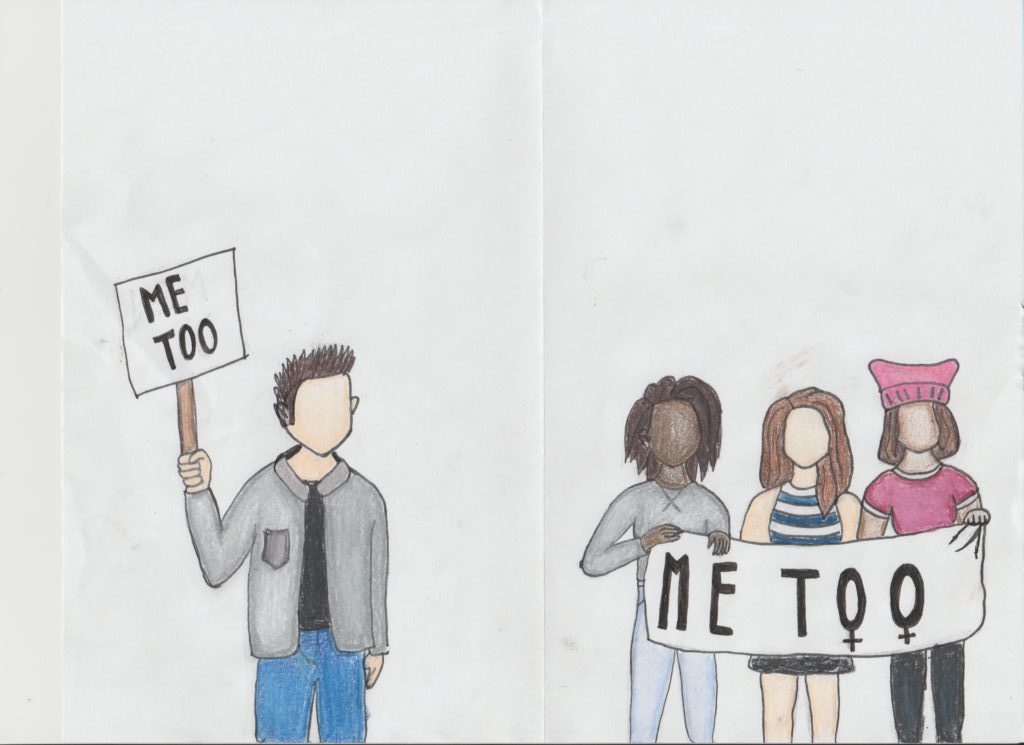Despite the cultural progress made by the #MeToo movement, the state of Georgia is still stuck in the past when it comes to how sexual assault is handled legally. Illustration by Luna Reichert
Our country, and most of the world, has a problem with discussing uncomfortable topics.
It’s much easier to set up and knock down strawmen, and offer temporary solutions instead of actually looking at the problem as a whole. Many movements have emerged in light of this to generate and have those uncomfortable conversations, most notably the #MeToo movement.
The #MeToo hashtag was a recent movement on social media that served as a rallying cry for victims of sexual assault and rape. It exposed many high-profile celebrities, such as Harvey Weinstein, Kevin Spacey and Bill Cosby, as having a long history full of these horrendous crimes.
The majority of the victims stepping out with their stories were female, but some males, such as Terry Crews — known for his bizarre Old Spice commercials and roles in the “Fast and Furious” series worked to raise awareness for men who were victims of sexual assault, as well. Crews went so far as to speak to the Senate regarding the issue.
In his speech, Crews condemned our culture of toxic masculinity that prevents men from stepping forward when they have been raped or sexually assaulted due to a fear of being viewed as a coward, or as weak. In a 2014, 38 percent of victims reported to UCLA’s Health and Human Rights Law Project were male. In 2012, another study by the Center of Disease Control found that one in 17 men were victims of some form of rape.
Despite these facts, Georgia does not allow men to press charges for rape.
Rape in Georgia is described as “as a man having ‘carnal knowledge’ of ‘a female forcibly and against her will.” Carnal knowledge is described as “any penetration of the female sex organ by the male sex organ” within the act of rape.
This means that men can not press charges or seek legal action if they are victims of rape and that they can only press charges for sexual assault. Sexual assault carries a maximum of 25 years in jail for those over the age of 16, while rape can be punishable by life in prison or the death penalty.
To deny that male rape is real or to deny men the right to press charges in the event of rape is unacceptable. In 2017, Atlanta changed its definition of rape to the FBI’s gender-neutral description which was updated in 2014. The new definition describes rape as “Penetration, no matter how slight, of the vagina or anus with any body part or object, or oral penetration by a sex organ of another person, without the consent of the victim.”
Following Atlanta’s change, the city saw a double in the amount of rapes reported in 2016. Despite this information, the rest of Georgia still has the outdated definition of rape.
Under state Senate bill 145, the statewide definition of rape would be expanded to include both genders. However the bill failed to pass in 2017 and has made no motion towards being passed in 2018.
The fact that this is happening in light of all the progress made through the #MeToo movement is appalling and the people of Georgia should rally to fix it.
The state of Georgia continues to operates in complete ignorance of clear statistics, and our state’s legislators refuse to move forward.
To end our culture’s history of ignoring sexual assault, we need to attack the issue from the top and acknowledge rape no matter gender and always carry the same legal consequences.
